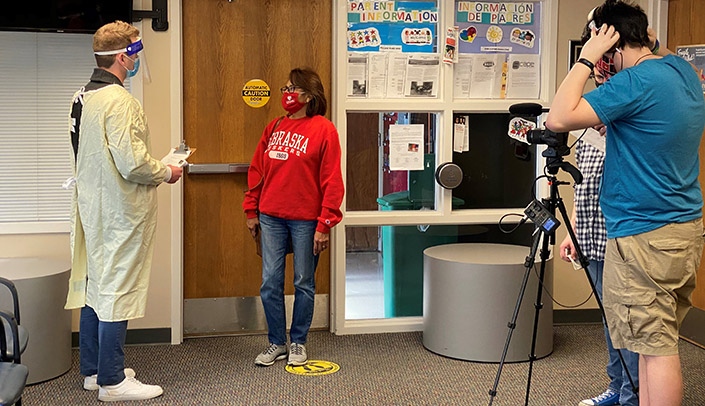The Munroe-Meyer Institute Leadership Education in Neurodevelopmental and Related Disorders (LEND) program lent its expertise to the Autism Society of Nebraska (ASN) recently for a collaboration to create a series of educational videos for people on the autism spectrum on dealing with the COVID-19 pandemic.
The collaboration grew from a Department of Health and Human Services grant that let the ASN build a website with COVID-19 information and resources, as well as skill development activities for staying safe from COVID-19.
Led by Cindy Ellis, MD, director of LEND, a group of 12 LEND faculty and students, along with some community volunteers, worked with a videographer to make a number of short instructional videos.
Topics included:
- A COVID-19 overview;
- Hand washing;
- Wearing masks;
- Social distancing;
- COVID-19 screening;
- COVID-19 testing, and
- Contact tracing.
“We demonstrated how to put on different kinds of masks, different examples of social distancing and what to expect when you get tested for COVID-19,” Dr. Ellis said. “Yes, we did have volunteers who got their noses swabbed.”
Megan Misegadis, who oversaw the project for ASN and is a LEND graduate herself, said the collaboration with MMI was vital to the success of the project.
“We reached out to Dr. Ellis and LEND for the medical portion, on how to protect from COVID-19,” she said. “She was just fantastic; she really used her expertise to deliver a high-quality product for us.”
Misegadis said Dr. Ellis also added narration over the videos, explaining each topic with clarity.
“The goal for the project is to use evidence-based practices and teaching strategies to help individuals on the spectrum stay safe and self advocate as it relates to COVID-19 and their physical and mental health. It is structured in a way so individuals on the spectrum, caregivers or and even health care and service providers can go to the site and see the information broken down in easily understood terms,” Misegadis said.
It was important that the audience see that the videos were Nebraska-generated, and Dr. Ellis and her team wore Husker T-shirts, UNMC facemasks and used other props to give the videos a Nebraska touch.
“When people see someone they can relate to or who looks like them, they can more easily picture themselves doing those things also — especially someone with autism who may have difficulty taking another person’s point of view,” Dr. Ellis said.
“The structure of each of these skills is set up to teach, model and provide practice tips and reflection questions,” Misegadis said. “The video component and structuring of the skills is so important. You can find written content all over the internet but not with the explicit teaching and video modeling components. Having it structured this way will allow people to revisit the site as often as needed to keep working those health self-advocacy skills. That was so important.”
The videos are on the Autism Society of Nebraska website.

Where can these videos be viewed?
The videos will be available on the Autism Society of Nebraska website within the next few weeks.